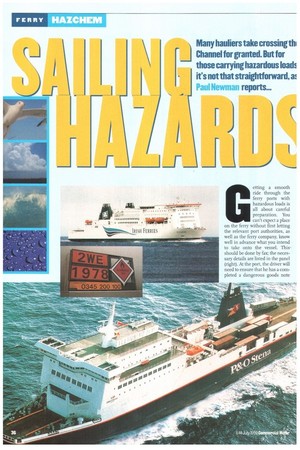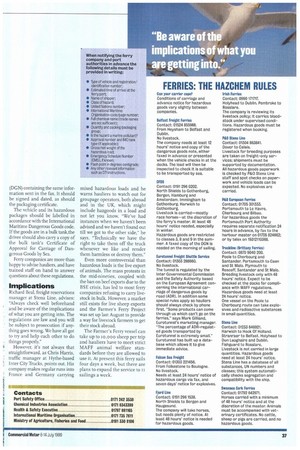---mr- i Many hauliers take crossing thi ---mr- i Many hauliers take crossing thi
Page 38

Page 39

If you've noticed an error in this article please click here to report it so we can fix it.
1 Channel for granted. But for those carrying hazardous loath rt's not that straightforward, a: Paul Newman reports...
Getting a smooth ride through the ferry ports with hazardous loads is all about careful preparation. You can't expect a place on the ferry without first letting the relevant port authorities, as well as the ferry company, know well in advance what you intend to take onto the vessel. Thisshould be done by fax; the necessary details are listed in the panel (right). At the port, the driver will need to ensure that he has a completed a dangerous goods note
(DGN) containing the same information sent in the fax. It should be signed and dated, as should Ihe packaging certificate.
The vehicle and its hazardous packages should be labelled in accordance with the International Maritime Dangerous Goods code. If the goods are in a bulk tank,the driver should also carry a copy of the bulk tank's Certificate of Approval for Carriage of Dangerous Goods by Sea.
Ferry companies are more than happy to advise hauliers, and have trained staff on hand to answer questions about these regulations.
Implications
Richard Beal, freight reservations manager at Stem. Line, advises: "Always check well beforehand and be aware of the implications of what you are getting into. The regulations are law and you will be subject in prosecution if anything goes wrong. We have all got to try and help each other to do things properly."
However, it's not always that straightforward, as Chris Harris, traffic manager at Hythe-based Inter City Trucks, points out. His company makes regular runs into France and Germany carrying mixed hazardous loads and he warns hauliers to watch out for groupage operators, both abroad and in the UK, which might include hazgoods in a load and not let you know. "We've had instances when we haven't been advised and we haven't found out till we got to the other side," he says. "Technically we have the right to take them off the truck whenever we like and render them harmless or destroy them."
Even more controversial than hazardous loads is the live export of animals. The mass protests in the mid-nineties, coupled with the ban on beef exports due to the BSE crisis, has led to most ferry companies refusing to carry livestock in bulk. However, a market still exists for live sheep exports and the Farmer's Ferry Project was set up last August to provide a way for livestock farmers to get their stock abroad,
The Farmer's Ferry vessel can take up to to,000 sheep per trip and hauliers have to meet strict MAFF animal welfare standards before they are allowed to use it. At present this ferry sails four days a week, but there are plans to expand the service to ii sailings a week.








































































































